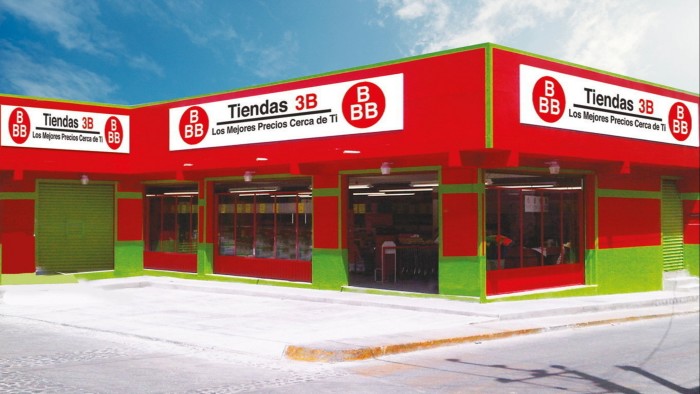Tiendas 3B sells hard discount retail to brand-loving Mexicans

Simply sign up to the Retail sector myFT Digest -- delivered directly to your inbox.
When Anthony Hatoum moved to Mexico in 2004, he didn’t speak Spanish and his only experience there was from one project as a McKinsey consultant. Now, he owns one of the country’s largest discount retailers, opening stores at the rate of one a day.
Hatoum’s idea for the business was sparked when, while working for Merrill Lynch, he oversaw an investment in Turkish hard discounter BIM. He wondered where the model pioneered by Germany’s Aldi and Lidl might work next. His research led him to pick Mexico for its large size, political stability and deep capital markets, he says.
“I started with a clean sheet of paper,” he tells the Financial Times at his company’s head office in Mexico City. “Whatever metric I looked at, Mexico always was in the top three.”
He raised money from investors, with the largest being Quilvest Capital Partners, a private equity firm owned by the family of the founder of Argentina’s Quilmes beer. Hard discount companies are usually privately held because they need 10 to 15 years to get started, he says.
In less than 20 years, Tiendas 3B has opened more than 1,800 stores across the country. Revenue, which was $1.14bn in 2021, is growing at about 30 per cent a year, putting it on the Financial Times’ list of the fastest-growing companies in the Americas.
Tiendas 3B, which stands for “Bueno, Bonito y Barato”, or “Good, Nice and Cheap”, uses a “cookie cutter” format for its shops, Hatoum says. Each is about 400-500 square metres, roughly the size of a large convenience store.
Its main competitors are major supermarkets. Industry leader Walmart operates most of its Mexican shops under the discount brand Bodega Aurrerá, which has more than 2,290 stores — almost half of which are in the smaller, local format that competes more directly with 3B.
“Will I conquer the whole market?” asks Hatoum. “Absolutely not, but I’ll be a very strong player in the niche I’m playing in and this niche in Mexico happens to be huge.”
The chain usually stocks two of each product, one a well-known popular brand and the other a private label made for 3B itself. That means less variety but allows for lower overheads, he says.
The company’s Mexico City head offices have a cheap and cheerful feel, with plastic folding tables in the main meeting room, while employees huddle in smaller booths testing an array of products.
“We test in the store, we test in focus groups, we test in market research,” Hatoum says. “Sometimes, I think we’re a market research company more than anything else.”
The company, which has 17,000 employees, is now in 13 states in the centre of the country, with one warehouse in each state under relatively autonomous regional managers who can easily be benchmarked against one another. Expansion is under a “stretch” rather than a “leap” philosophy, so it will not open in cities a long way from existing stores.
Inflation has hit Mexico hard since the onset of the pandemic, providing a tailwind for 3B’s business model as consumers are forced to economise. Overall inflation peaked at 8.7 per cent in August and September last year, but the rate of food price rises has been even higher, reaching more than 14 per cent in 2022.
Alvaro Garcia, a retail analyst at BTG Pactual, says hard discounters had previously struggled in Mexico because of consumers’ preference for well-known names, but 3B seems to have found the right formula.
“Mexicans love their brands,” Garcia explains. However, with industry leader Bodega Aurrerá now actively pushing its own private labels, 3B may benefit from a change in consumer habits. “I do think we’re at the early innings of a transformation in that shopping behaviour.”
Inside a Mexico City store, Hatoum points out the products the company created. He says they aim to be about 20-30 per cent cheaper than well-known names and save time on restocking the shop floor as they can be left in boxes. “This is a very efficient box, to open this box takes me a second,” he says, pointing to a specially designed cardboard box that can be left on the shelves as-is. “So, you shaved a few seconds but that’s how we think.”
Eventually, the company’s investors will want an exit, which will mean either being bought out or going public, Hatoum says. Mexico’s stock market has seen a years-long drought without new issuance and some of its biggest names have even been delisting. Hatoum thinks that could mean there is pent-up demand for a Mexican share issue.
Walmart, convenience store chain Femsa and other retailers have also been branching out into new areas such as financial services. Asked if he planned to also branch out into entirely new divisions, he says he wants to focus on his current business. “Is it not better to just focus on your core business and make sure you grow it versus getting distracted?” But he concedes it is something the next generation could do. “You can see this business as a platform to launch many other businesses.”

Comments